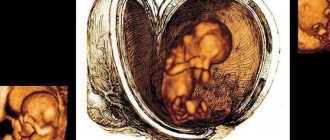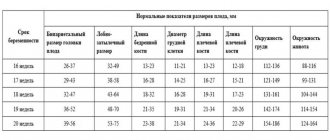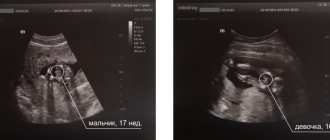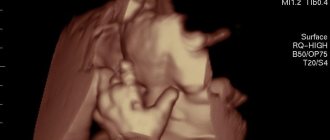This week your baby weighs about 450-500 g. The skin is still wrinkled and reddish in color. The fluff covering the skin darkens. While in your tummy, the baby hears many sounds, especially loud ones, and gets used to them. After birth, he will no longer be afraid of the vacuum cleaner or the barking dog. Blood vessels actively develop in the lungs, preparing the baby for independent breathing.
At week 23, he is already constantly making movements similar to breathing. The lungs do not open, but allow some amniotic fluid to enter. This liquid is instantly absorbed and does not harm the child’s respiratory system. The fetus is now capable of making about 50-60 “inhalations and exhalations” per minute. Sometimes he takes breaks for half an hour or even an hour, and then breathing movements resume.
The parts of the fetal digestive system are quite well formed by this week, each organ performs its functions - from the esophagus to the intestines. The pancreas, liver, and kidneys are working. The hematopoietic function is performed by the red bone marrow, lymph nodes, spleen and thymus gland.
What happens to the child during this period?
Your baby is changing by leaps and bounds. All internal organs are already almost completely formed . But they still have an average of fifteen to twenty weeks to develop. During this period, the baby will prepare for a new, extrauterine life. What is happening to the baby now?
At 23 weeks from conception, the baby continues to increase brain volume. If we compare it with what it was at the time of pregnancy, the increase occurred more than tenfold. Over the next few weeks, the brain will become heavier by another 5! The baby needs a constant flow of oxygen, so the expectant mother needs to spend more time in the fresh air, relax and receive positive emotions. The digestive system also continues to improve.
At this time, all organs are already working. The gallbladder produces bile, which later becomes the original feces - meconium. The amniotic fluid enters the stomach through the esophagus, from which the necessary sugars and useful substances are released with water. The baby trains his lungs by making breathing movements. Because of this, the mother may feel the baby hiccupping: there is nothing wrong with that.
The baby accumulates subcutaneous fat, but the dermis itself is still quite thin and wrinkled. Marigolds form on the fingers. If you do an ultrasound scan at this stage, you can clearly see the sex of the baby. Boys have developed a scrotum, and girls have ovaries.
Condition of the mother's body
From the 23rd week, the pregnant woman begins to feel nagging pain that occurs in the lower abdomen. They prepare the body for future childbirth.
A pregnant woman's belly grows and she gains weight. Already there is discomfort when bending over, as well as when sleeping. The woman's gait changes noticeably. This is caused by the separation of the pelvic bones. This process is necessary for the upcoming birth. Also unpleasant sensations are:
- Swelling of the legs;
- Breast augmentation;
- Heaviness in the legs;
- Discharge from the chest when pressed.
Pigmentation appears on a woman’s body (nipples, a stripe in the lower abdomen). Sometimes nausea and heartburn appear. This is explained by the increased pressure of the uterus on the stomach and bile ducts. The expectant mother needs to take walks outside and breathe fresh air more often.
Well-being of the expectant mother
If you are having your second or third baby, then you are probably familiar with all the sensations. Inexperienced women preparing to become mothers for the first time listen more carefully to themselves and their feelings. What are they experiencing during this period?
- The baby's movements become more distinct and obvious. Now the mother can no longer confuse the kicks of the unborn baby with increased intestinal activity. A woman is able to recognize what position the baby is in and what he is doing.
- Many expectant parents note that at twenty-three weeks the urge to urinate becomes more frequent. This is especially noticeable at night. Try to limit your fluid intake in the evening, but drink plenty of water throughout the day.
- Swelling accompanies every third woman in labor from this period. Limit your salt intake. Don't give up water: this is not why swelling is present. Be sure to consult your doctor about this issue.
- After 23 weeks, the expectant mother’s belly begins to actively grow. To prevent stretch marks from forming, use suitable cosmetics. Take care of your body now so you don't get upset later.
- Heartburn is a common companion of pregnant women. This unpleasant sensation appears around this time. Find your own solution to the problem: use safe medications, mint lozenges, eat seeds. Do not try to extinguish internal fires with soda - this is not the best option.
After 20 weeks, expectant mothers begin the most pleasant period. Toxicosis is over, and the tummy is not so big yet, it does not create interference or inconvenience. You have a good opportunity to enjoy your situation, but do not forget to undergo the necessary research and visit your doctor.
Recommendations
- Balanced diet. In order to prevent excess weight in the unborn baby, as well as to maintain her own figure, a woman should pay attention to planning her diet. And, of course, drink enough.
- Vitamins. Typically, gynecologists prescribe vitamin preparations when there are direct indications for this. However, we should not forget that, despite the abundance of products, not all of them are able to fully provide a woman’s body with the necessary nutrients. After consulting with your doctor, you can purchase a vitamin complex that is right for you.
- Physical activity. Pregnancy is not a reason to forget about an active lifestyle. It is in the second trimester that a woman can afford long walks in the fresh air, as well as various exercises. This provides the body of the expectant mother and her baby with oxygen, energizes her and gives her a good mood. Swimming in the pool and yoga are quite popular among pregnant women.
- Rest. For the full development of a healthy person, it is necessary that his mother experiences less stress and devotes enough time to rest and sleep. When a woman is too tired and worried for various reasons, the baby feels it. In addition, a pregnant woman’s body is already under stress, and stress and lack of sleep only further wear it down.
- If your gynecologist says there are certain risks that could lead to termination of pregnancy, you should refrain from intimacy so as not to create additional stress on the pelvic floor muscles and not provoke a miscarriage.
- Calm environment. The baby not only feels his mother’s heartbeat, but also catches her mood and hears what is happening outside his little world. Relaxing or classical music, reading aloud, and singing have a positive effect on his development.
Remember that the baby feels good when his mother feels comfortable and is in a positive mood. Enjoy this wonderful time of unity with your future baby and take care of yourself!
Ultrasound scanning of pregnant women at 23 weeks
In order not to miss possible pathologies or abnormalities, you should strictly follow all the doctor’s prescriptions. One of these may be ultrasound. 23 weeks of pregnancy is the period when the second screening period comes to an end. If you haven't completed it yet, hurry up.
At this time, deviations in the development and formation of the baby may be discovered that will be incompatible with life . In such a situation, the woman is offered to terminate the pregnancy. It is possible up to 27 weeks, but it has a high risk of complications. If this happens to you, then be sure to weigh the pros and cons, and then make the right decision.
Do not be scared and refuse diagnosis. Pathologies that indicate a child’s non-viability are detected extremely rarely. By visiting a specialist's office and having a scan, you can make sure that your pregnancy is proceeding smoothly.
Many expectant mothers, in addition to an ultrasound, also need to donate blood at 23 weeks . Most often this manipulation is performed between 17 and 19 weeks, but due to special circumstances the dates may be postponed. Women with increased risks need a blood test. These include:
- women giving birth after 35 years;
- expectant mothers who were found to have abnormalities during the first screening;
- women who have previously given birth to children with genetic disorders;
- patients with a persistent threat of miscarriage;
- expectant mothers using medications contraindicated during this period.
In addition to a planned examination, an ultrasound scan at 23 weeks can be performed unplanned, urgently.
Tests and examination
Throughout pregnancy, a woman needs to undergo various tests so that doctors can assess her condition. Regular blood and urine tests show changes in the pregnant woman's condition. For example, there are diseases that can be asymptomatic, or a woman is not able to distinguish the signs of the disease from her “usual” condition. In this case, certain indicators in the tests indicate the presence of some processes in the body, and in connection with this, the pregnant woman is prescribed appropriate treatment. A general blood test helps monitor hemoglobin levels so that they can be adjusted if necessary. A blood glucose test allows you to determine the risk of rapid weight gain in your baby. Assessing the results, the gynecologist can give recommendations to the woman to change the quality of her diet.
If a pregnant woman notices a change in the nature of her discharge (in color, consistency or smell), she should inform the doctor managing the pregnancy. In this case, a smear is taken to determine the presence of pathogenic microflora. This is important to do in order to cure the disease in time and prevent it from infecting the baby.
In addition to general tests during pregnancy, a woman undergoes blood tests to determine her blood type and Rh factor, as well as diseases such as HIV, hepatitis, syphilis and TORCH infections. In addition to the gynecologist, the examination is also carried out by other specialists to identify diseases that may affect the course of pregnancy. If for some reason a woman has not done the necessary tests and has not seen the necessary doctors, she needs to do this.
Indications for the study
Let's assume that you have already passed the second screening or have refused it altogether. Despite this, the doctor prescribes another ultrasound examination for you. For what and why? Indications for this direction may be as follows:
- multiple pregnancy;
- history of caesarean section;
- placenta previa;
- covering the internal pharynx with a child's place;
- isthmic-cervical insufficiency;
- bleeding or abdominal tenderness;
- premature contractions and labor;
- determining the sex of the child (due to the likelihood of genetic abnormalities transmitted in a certain lineage).
In fact, there can be many reasons for carrying out unscheduled diagnostics, and they are different. Even if the expectant mother took some medications, suffered a viral or bacterial disease, treated an inflammatory process occurring in the uterus - all this should culminate in determining the baby’s condition. The most accurate and reliable method at this stage is ultrasound.
Transabdominal diagnosis
Most often performed by transabdominal ultrasound. The 23rd week of pregnancy is a period when the uterus has already reached the level of the navel and even crossed it. Therefore, it will be quite easy for the doctor to determine the condition of the baby. The study does not require any specific preparation. Only in some cases, the doctor may ask you not to urinate for half an hour before the procedure.
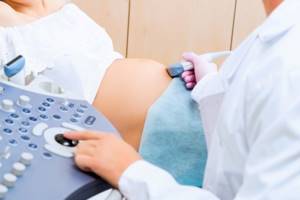
Transabdominal ultrasound
The manipulation is performed on a special couch. A conductive gel is first applied to the abdomen. Surely, you have already encountered this procedure. An ultrasound lasts on average 15-30 minutes . At this time, it is considered the longest, since the specialist needs to consider all the features, starting from the condition of the uterine walls and pharynx and ending with the internal organs of the fetus.
Transvaginal examination
The use of vaginal sensors during this period is very rare. They have to be used when the transabdominal guidewire is faulty or cannot show the necessary information. If the baby has a cephalic presentation, it may be difficult for the doctor to examine parts of the brain and parts of the face.
Transvaginal examination helps to reliably determine the condition of the cervix and cervical canal. If a woman has any pathologies, for example, ICN, then such manipulation is inevitable.
Body changes and new sensations for women
At the end of the second trimester, a woman may encounter such an unpleasant phenomenon as symphysitis during pregnancy.
Its symptoms may be the following: severe swelling in the symphysis (pubis), pain in the groin, pubic bone, tailbone, sharp pain when changing the position of the body (it becomes simply impossible to raise a straight leg in a lying position). The cause of symphysitis is excessive softening of the symphysis pubis. The softening of bone tissue itself is a completely natural process during the period of waiting for a baby. How else will the child be born? After all, he will need to go through the birth canal, while pushing the pelvic bones apart without harm to himself and the mother. What to do if your pubis hurts? Keep your weight under control - obesity greatly increases the load on the pubic bone. If you experience pain when lying down, relieve pressure on your hip joint by placing pillows under your buttocks and legs. Include foods containing calcium in your diet (one of the causes of symphysitis is a lack of this trace element in the body). Wear a bandage, do physical therapy for pregnant women, and be sure to tell your doctor about your discomfort.
Data obtained: norms and deviations
During the examination, the physician assesses the size of the fetus, checks for the presence of vital organs, and determines motor and cardiac activity. Particular attention is paid to the reproductive organ: the location of the placenta, its degree of maturity, the possibility of tone, and the amount of amniotic fluid are determined.
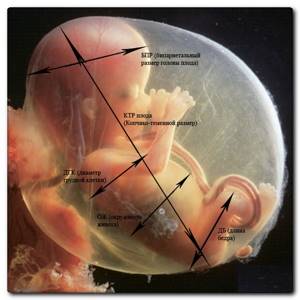
All data obtained are entered into the study protocol. Your gynecologist can decipher them. It is worth remembering that the ultrasound conclusion is not a diagnosis. The specialist only adds those features that he sees on the monitor. Based on them, the gynecologist takes further tactics. What indicators should normally be determined at 23 weeks of pregnancy?
- The baby's weight is 500-520 grams, and his height is about 25 centimeters;
- The biparietal size is about 6 cm, and the head circumference is from 19 to 24 millimeters;
- The volume of the abdomen in a room ranges from 16 to 20 millimeters;
- Shoulders – 3.5-4.5 cm, and ulna – 3-3.7 cm;
- The shinbones are about 3.5 centimeters;
- The placenta has zero degree of maturity.
Deviation from the norms is always considered individually. For example, stunting and low weight may indicate intrauterine developmental delay. This may also be a variant of the norm. If you and your partner are not tall and heavy, then you should not wait for Gulliver to appear.
Surely your baby will be small too. If a lag in certain indicators is accompanied by premature aging of the placenta or hypertonicity of the uterine walls, then a suspicion of oxygen starvation of the fetus arises. In such situations, the woman is prescribed correction with medications. Don’t worry: after therapy everything will return to normal, it is important that you notice the pathology in time.
Preparation and process of the procedure
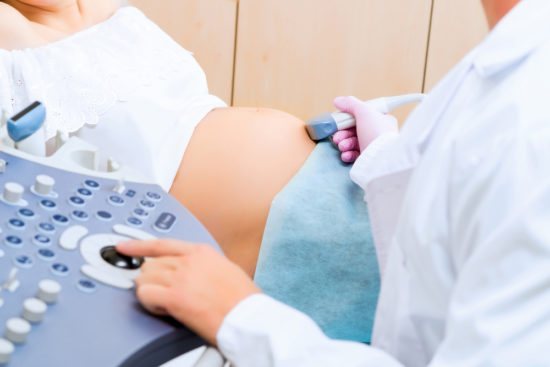
Ultrasound in later stages, including at 23 weeks, is done transabdominally - through the anterior abdominal wall. It does not imply any specific preparation.
The research procedure involves sliding a special sensor over the abdomen. Slip occurs thanks to the use of gel. At home, before an ultrasound, you do not need to apply any creams to your stomach. After the doctor has found out all the parameters of interest, you need to blot off the excess gel. The ultrasound procedure will not affect your further well-being in any way.
Dopplerography
Very often, an ultrasound examination performed at this time involves studying blood vessels and blood flow. This diagnosis is called doplegraphy. This study is definitely indicated for those patients who have been diagnosed with pathologies, for example, IUGR or decreased fetal growth rates. Indicators that fall within normal limits should have the following values:
- uterine artery index up to 0.38;
- umbilical arteries from 0.6 to 0.8;
- umbilical cord artery ratio from 3.4 to 3.6;
- blood flow speed in the artery is 25.6-27.7 cm/s;
- internal carotid artery 0.94;
- uterine artery 1.95.
The received data is decrypted by a specialist. Don't try to diagnose yourself.
Good to know
In what trimester of pregnancy can you have sex?
Pregnancy and constipation: how to improve bowel function? 9 tips
Constipation during pregnancy: how to cope without medication
Why did the intestines begin to work poorly?
Recommendations for driving during pregnancy
Can a pregnant woman drive a car?
Driving rules for pregnant women
Pregnant woman on public transport
We're expecting a baby... while driving
All texts for pages about mother and baby were kindly provided by RAMA Publishing - these are chapters from the book by Svetlana Klaas “Your Favorite Little Man from Conception to Birth”, reviewer Irina Nikolaevna Kononova, Candidate of Medical Sciences, Associate Professor of the Department of Obstetrics and Gynecology of the Ural State Medical Academy (Ekaterinburg).
Summarize
An ultrasound scan performed at 23 weeks of pregnancy can reveal a lot of important information. Previous research carried out during the first screening is not yet able to provide data on the child’s internal organs and blood flow. It is undoubtedly very important. But ultrasound at 23 weeks of pregnancy is no less important.
Don't give up on this kind of research. Especially if you have certain indications. Ask your gynecologist about the specifics of the procedure and the necessary preparation. After visiting the ultrasound scanning room, contact your gynecologist to get a transcript of the data. Have an easy pregnancy and good research results!
Beauty and accessories
Are you afraid that pregnancy may take away your beauty? This is wrong! Yes, the expectant mother’s body changes while she’s expecting a baby, but if you lead a healthy lifestyle and eat right, the hormonal storm will only improve your appearance. Many expectant mothers note that their hair has become thicker, their cheeks are flushed, their breasts have enlarged, and their libido has increased. So, the 20th century sex symbol Sophia Loren claims that during pregnancy she felt much more attractive than at any other time. In her book “Women and Beauty,” the great Italian writes: “In my opinion, nothing makes a woman more beautiful than pregnancy, when she takes on a regal, independent appearance.” And he gives advice to women: “It’s difficult to do a pedicure because of your belly, put it off for the future. But pay special attention to your fingernails: file them, clean them, rub cream into the holes. I painted my nails different colors that I don't usually use. It entertained me and lifted my spirits.”
